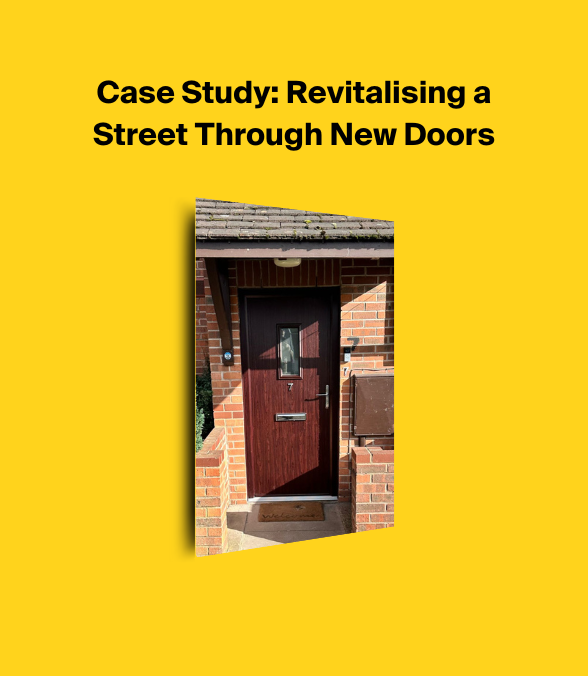Composite Door Issues
The right front door provides a positive first impression when guests come to visit you at home, and at Value Doors we believe that a new composite door can completely transform your home.
Composite doors have become popular among UK homeowners because of their many benefits. These doors are durable, practical, easy to maintain, strong, and long-lasting, and our grey doors are also much more attractive than the common composite door.
However, despite all these benefits, just like with uPVC or wooden doors, composite doors do come with a few minor issues that could arise over (a very long) time.
These problems shouldn't put you off from buying a composite door though, as there are easy fixes to the issues listed in this article.
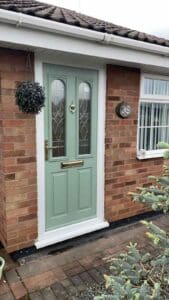
Before we look at the problems of composite doors and how to fix them, let's take a look at exactly what a composite door is.
What is a Composite Door?
Composite doors are made up of a combination of durable materials that overcome problems that are common in more traditional doors, such as lack of durability.
The combination of materials found in composite doors means these doors are incredibly strong, offer much better security, and make for a longer-lasting door design.
All our composite doors are available with an insurance-backed guarantee
Composite door materials
Composite doors are made from Glass Reinforced Polyester (GRP), also known as fibreglass. These doors have a polyurethane core which makes them weatherproof and allows for enhanced security, especially when coupled with a top-quality locking mechanism.
The properties of these materials make these doors unlikely to warp, swell, or rot - problems that are common with timber doors in the UK.
Problems with Composite Doors and How To Fix Them
Here are the most common composite door problems:
- Swelling or warping in the sun
- Sticky locks
- Worn or damaged weather seals
- Drainage issues
- Staining
- Dropped hinges
- Fading
All these problems are common with every type of door, such as bifold doors and french doors, so more often than not, they are easily spotted and fixed. Let's take a look at each of these issues in greater detail and see how these problems can easily be solved.
1. Swelling and warping
All doors are prone to swelling or warping during the summer, and composite doors are no exception.
If the sun is shining directly onto your composite door, it can cause the door to expand slightly, which could make it difficult for you to close the door.
This is a common problem for south-facing homes, and homeowners of homes in this position should make sure they get properly sized doors to allow for slight swelling during summer.
The solution
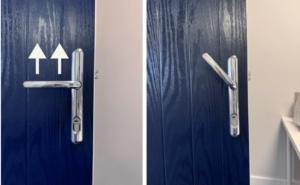
The first thing you can do to prevent composite door warping is to always close the door properly and pull the handle all the way up when you are closing the door - this is also called "throwing the handle".
This will ensure the door is snug within the frame and can prevent it from warping as the door locks will be fully engaged.
Should the door not be closed properly and the handle not be pulled up, the door will be resting on the latch, which only holds the middle of the door secure, which can result in swelling or warping in the long run.
By "throwing the handle" each time you close the door, you will prevent future costly repairs or door replacements.
It is also a good idea to regularly clean your door handles to keep them in the best condition, so you don't have issues throwing the handle.
If you're planning on still having a composite door installed, make sure to consult a professional in the industry to take proper measurements. This will prevent you from accidentally purchasing an oversized composite door.
2. Sticky locks
Composite doors are easy to maintain, but, like any door, they do require a level of maintenance if you wish to keep all the components working smoothly.
Almost nothing is so frustrating as a sticky lock. A locking mechanism that is getting stuck or a little bit niggly can prevent you from properly closing your door, which could be a security issue or can lead to warping, as explained above.
It's crucial that locks work properly to ensure your home security is up to scratch, which means you have to maintain your locking mechanism to prevent it from sticking.
The solution
To prevent your composite door locks from sticking, use a silicone or graphite lubricant on your locking mechanism once every six months. This will ensure that your locks are working as they should.
Avoid using any oil or greasy lubricants as these can damage your locks and cause them to stick even more, along with other lock problems.
3. Worn weather seals
Weather seals or gaskets are added to composite doors to prevent rainwater from seeping into your home. These seals are securely fitted into grooves in the door, but they can become dislodged which could result in rainwater or even wind entering your home.
The solution
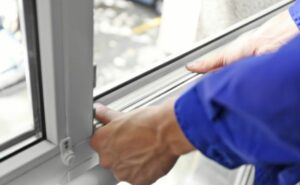
In this case, prevention is better than cure. Regularly check the weather seals to ensure they're properly fitted and secure in the grooves.
If you notice that the weather seals have dislodged or slipped out of their grooves, push the seal back into place.
Should the seals not be fitted correctly, they can be damaged or cause damage to the door when closing it, and can also let rainwater into the house.
4. No drainage in the door frame
Your new composite door comes with a drainage system in the frame that will ensure your home stays dry even in the worst rain storm.
The built-in drainage system makes use of drainage holes and slots in the door threshold so that rain and runoff drain away from your home's interior.
Sometimes heavy rain, debris, and dust can block the drainage system, which can cause rainwater to build up and enter your home, causing significant water damage.
The easiest way to spot a drainage issue is if water is pooling up between the weather seals or gaskets.
The solution
Preventing the holes from becoming blocked is the first step to not experiencing this problem that is common with all exterior doors.
Check the drainage system once or twice a year - especially if you are expecting heavy rainfall or prior to the winter months - to make sure there are no blockages.
Should you notice any blockages in the drainage holes, use a screwdriver or any narrow tool to loosen any debris and clear the holes.
Once you have removed the debris, flush water down the holes to completely clean them out and make sure they are working as intended.
If you notice there is still some water pooling, use your chosen tool to again try to loosen any dirt that may be trapped. Continue this process until you can flush freely with water and all the water flows away.
5. Staining
It's not unusual or unexpected for composite doors to experience wear and tear as the years go by. This natural wear and tear includes a certain level of staining.
Composite doors that have stainless steel or glazing trims may appear to have staining on the edges that can be confused with rust or corrosion. However, stainless steel does not rust, and these marks are simply a build-up of oxidised contaminants.
Staining can be a result of dirty hands pushing open the door, muddy paws jumping against the door, or someone accidentally spilling a cup of coffee while opening the door.
Although these stains are just a part of life, there is an easy fix to prevent permanent stains from occurring.
The solution
Although composite doors are very low maintenance, a quick clean will ensure you do not have to deal with unsightly stains. The best way to prevent permanent staining is to give the door a quick clean as soon as you notice any dirt on the door.
Cleaning a composite door does not take any special skills - you simply use some warm water, mild detergent and a soft cloth to remove any visible stains or dirt.
For those stains that simply seem too stubborn to get rid of, use a strong, composite-friendly detergent and rub the spot vigorously with a soft cloth or microfibre towel.
You should also clean your stainless steel trims if you notice any oxidised contaminants on the surface.
You can even stain composite doors yourself as an alternative to painting them depending on what kind of look you are after.
6. Dropped hinges
A composite door hinge is self-lubricating but as this is one of the most used parts of the door under constant strain, they can get worn.
The purpose of these hinges is to prevent frequent door maintenance, and also ensure that the door continues to open smoothly no matter how many times you open and close it.
Sometimes it happens that the hinges on your composite door begin to drop, which can cause the door to slip out of position and cause it to snag on the door frame.
Constant use can cause door hinges to drop - this is not an unusual problem and can easily be fixed.
The solution
Although composite doors come with self-lubricating bearings, you can maintain the hinges by applying a lithium-based lubricant to the hinges and central barrel every couple of months to ensure they continue to work as planned.
Dropped door hinges will require some minor hinge adjustment, which can be achieved even by those lacking DIY skills.
To re-adjust the hinge, use a hex key and a screwdriver (we recommend a flathead and a Phillips-head screwdriver) to get the hinges back into their proper positions.
7. Fading
Most exterior doors will fade when constantly exposed to direct sunlight, and although composite doors are incredibly durable, they will also eventually start fading. (But it could take up to eight years before you notice any significant change in colour!)
The rate of fading of your door will depend on the colour pigments or resin used in your composite door, as well as the amount of direct sunlight and the strength of the UV rays that hit the door.
The solution
Fading isn't a very common problem when it comes to composite doors, and once it fades (many years down the line), it won't be possible to restore the original colour. However, you'll be able to protect it from any further fading.
Composite doors can be sprayed or painted with a UPVC coating which will protect them from the sun's rays.
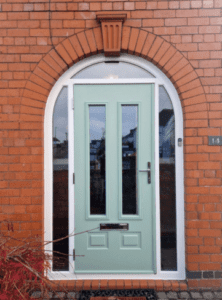
Why Choose Composite Doors for Your Home or Office?
A composite door can completely transform your home and is much more cost-effective than a traditional wooden door since a composite door won't require regular maintenance or replacement.
If you need any more convincing, here are some of the amazing benefits associated with composite doors for your home or office:
- Long-lasting: The composite material used to manufacture composite doors is incredibly durable, meaning these doors will last for many years.
- Improved home security: Security is probably the top concern for any homeowner, which is why our doors come with the latest technology when it comes to the locking mechanism. The doors are also incredibly strong, made from GRP (glass-reinforced plastic) with a strong core, which will deter any potential home invaders.
- Beautiful grey colouring: Our grey composite doors are unique and will make your house stand out on the street, even when compared to other homes with composite doors.
- Damage resistant: These durable doors require minimal maintenance to keep them looking brand new. They are not prone to scratches or water damage and are completely weatherproof.
- Watertight: The built-in drainage holes and the outer coating of the doors make them watertight and resistant to water damage. A properly fitted composite door will keep your home dry and warm.
- Energy-efficient: The glass elements in the composite door material, coupled with a thick insulating core, will ensure your house is properly insulated and keep out the cold air.
Buy Our Composite Doors With Peace of Mind
We're passionate about offering home security solutions while also offering a beautiful finish to the front of our client's homes.
Because of this passion, we decided to enter into the composite doors industry, and we aim to produce elegant front doors that offer security and an attractive finish to your home.
We believe in having peace of mind when it comes to feeling safe in your home, and our doors are strong, durable, long-lasting, easy to maintain, and attractive.
They're the perfect solution for any homeowner looking to increase their home security while maintaining beautiful curb appeal.
The most secure and beautiful grey composite doors
Your front door is the portal into your home, and also the element that keeps intruders at bay. We understand this, which is why we believe it is important that clients get a say in how their composite door looks.
Our grey composite doors come in a variety of styles, from glazed door panels to glass windows that let in natural light. We offer traditional, classic, Victorian or modern doors to complement any home.
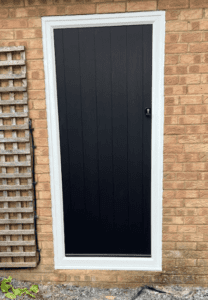
FAQs
How long do composite doors last?
Composite doors can last between 30 to 40 years with regular maintenance and cleaning.
Do composite doors require maintenance?
Your composite door won't require any intensive maintenance. You can clean your door with some mild soap, warm water and a cloth.
You should also check that the drainage slots are free from debris, apply lubricant to the hinges and locking mechanism, and ensure the weather seals are firmly in place.
Is it worth getting a composite door?
Composite doors are great options for those who want to invest in a high-quality and durable door that requires little maintenance.
These doors are very energy-efficient and are able to trap heat and keep the cold at bay. The doors are also weatherproof and improve your house's security.
What is the difference between composite and uPVC doors?
A uPVC door is made entirely from plastic, while a composite door is made from a variety of materials, including fibreglass, which has been compressed and glued under high-pressure conditions to create a durable, long-lasting material.
How to fix a loose door handle?
Another problem that can occur with composite doors is a loose or jammed door handle. To fix the door handle, you should check for loose screws and either retighten them or loosen them depending on whether your door handle has misaligned or is still in place.
If it has misaligned, you should unscrew your door handle and realign it to make sure it is in the right place. Once this is done, screw the handle back in place to get a functioning and effective door handle.
Final Thoughts
Composite doors may have a few minor problems, but these are all easily solved and also overshadowed by the amazing benefits that these durable doors offer.
Are you interested in investing in composite doors? Make sure to check out our range of grey composite doors, and check out our blog for more tips and tricks on these amazing doors.




